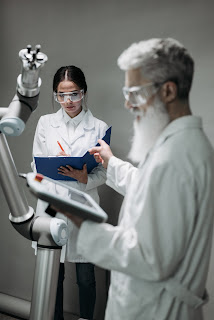In an era marked by rapid technological advancements, the integration of robots into the workforce has become a subject of both fascination and concern. Robots have evolved from being mere tools in manufacturing to sophisticated machines capable of performing tasks once exclusive to humans. This shift has raised questions about the future of jobs and the role of robots in the workforce. In this article, we will delve into the dynamics of robots replacing human jobs and explore the future implications of this transformation.
The Current Landscape: Robots in the Workforce
Robots have made substantial inroads into various industries, transforming the way work is done. In manufacturing, they have been a mainstay for decades, assembling products with precision and efficiency. These machines are often faster, more precise, and tireless, making them ideal for repetitive and physically demanding tasks.
Beyond manufacturing, robots have ventured into sectors such as healthcare, logistics, and agriculture. In hospitals, robotic surgical systems enable surgeons to perform complex procedures with unmatched precision. In warehouses, autonomous robots efficiently sort and pack goods, streamlining the supply chain. And in agriculture, robotic harvesters pick crops more quickly and gently than human laborers.
The Impact on Human Jobs
While robots offer undeniable benefits in terms of efficiency and productivity, they also pose a challenge to the human workforce. The most immediate concern is job displacement. As robots become increasingly capable, they are replacing human workers in many roles, raising questions about the livelihoods of those affected.
Manufacturing, in particular, has seen significant job losses due to automation. Routine tasks that once required assembly line workers can now be handled by robots. This has led to layoffs in some industries, causing economic disruption and job insecurity for many.
However, it's essential to note that the impact of robots on jobs is not uniform across all sectors. Some industries are more susceptible to automation than others. Jobs that involve routine, repetitive tasks are at higher risk, while those requiring creativity, complex decision-making, and emotional intelligence remain less vulnerable to automation.
The Changing Nature of Work
While robots may displace some jobs, they also create new opportunities. As robots take over routine tasks, humans can focus on higher-value activities that require creativity, problem-solving, and interpersonal skills. This shift in job roles highlights the need for upskilling and reskilling the workforce to adapt to the evolving job market.
Moreover, robots can enhance workplace safety. In hazardous environments, such as nuclear power plants or deep-sea exploration, robots can take on tasks that would endanger human lives. This not only protects workers but also opens up new frontiers in industries that were previously too dangerous to explore.
The Future of Robots in the Workforce
Looking ahead, robots are poised to play an even more significant role in the workforce. Here are some key trends and developments to watch for:
1. Collaborative Robots (Cobots): The future may see the rise of collaborative robots, designed to work alongside humans. These robots can assist workers, enhancing their capabilities rather than replacing them. Cobots are already being used in industries like manufacturing, healthcare, and logistics.
2. AI and Machine Learning: As artificial intelligence (AI) and machine learning algorithms advance, robots will become more adaptable and capable of handling complex tasks. This could lead to further displacement of jobs in certain sectors but also create opportunities for AI specialists and robotics engineers.
3. Ethical and Regulatory Concerns: The integration of robots into the workforce raises ethical questions, such as the impact on privacy, data security, and job equity. Policymakers will need to develop regulations that balance technological progress with social concerns.
4. Education and Training: To prepare the workforce for the future, there will be a growing need for education and training programs that equip individuals with the skills required to work alongside robots and AI systems effectively.
5. Global Implications: The adoption of robots varies by country and region. Some nations are embracing automation more rapidly than others. This divergence may lead to disparities in economic growth and job opportunities on a global scale.
The integration of robots into the workforce is an irreversible trend with far-reaching implications. While concerns about job displacement are valid, it's essential to recognize that robots also bring opportunities for innovation and improved workplace safety. To thrive in this evolving landscape, individuals and societies must adapt by fostering skills that complement, rather than compete with, robotic technologies. The future of work will depend on our ability to harness the potential of robots while addressing the challenges they pose. Ultimately, the success of this transition will be determined by our capacity to strike a balance between human ingenuity and technological progress.







.jpg)


No comments:
Post a Comment